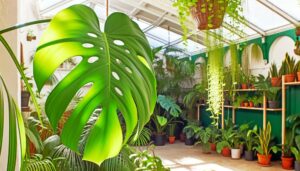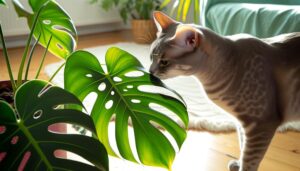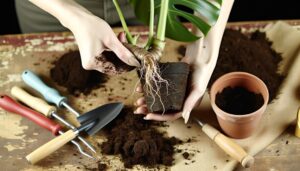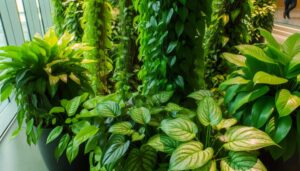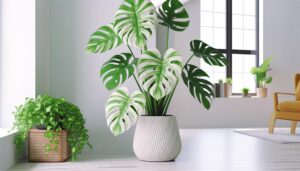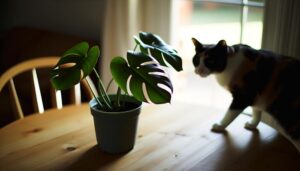Are Monstera Plants Toxic to Rabbits? Important Safety Tips!
Yes, Monstera plants are toxic to rabbits. They contain calcium oxalate crystals, which can cause severe irritation to your rabbit’s mouth, drooling, and gastrointestinal distress upon ingestion.
Symptoms to watch for include oral irritation, excessive salivation, and changes in drinking habits. To protect your rabbit, keep Monstera plants out of reach and regularly inspect living areas for any toxic plants.
If ingestion occurs, remove the plant material from your rabbit’s mouth and contact a veterinarian immediately. Ensuring a safe environment is essential for your rabbit’s health.
To learn more on prevention and care, continue exploring the topic.
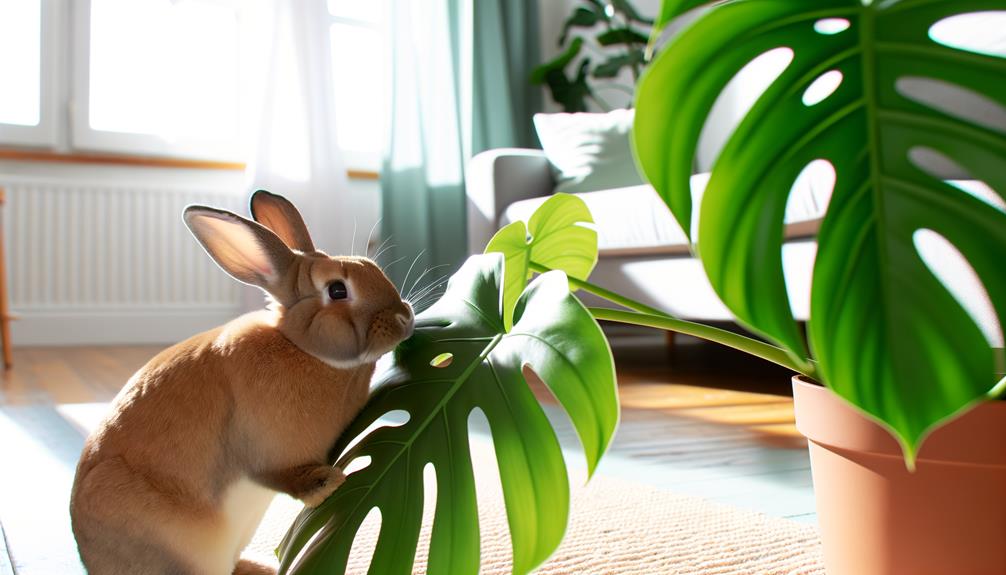
Key Takeaways
- Monstera plants contain toxic calcium oxalate crystals that can harm rabbits.
- Ingestion of Monstera can cause oral irritation, drooling, and gastrointestinal distress in rabbits.
- Immediate veterinary care is necessary if a rabbit ingests Monstera plant material.
- Keeping Monstera plants out of reach is crucial to prevent rabbit poisoning.
- Symptoms of Monstera poisoning in rabbits include lethargy and changes in drinking habits.
Understanding Monstera Plants
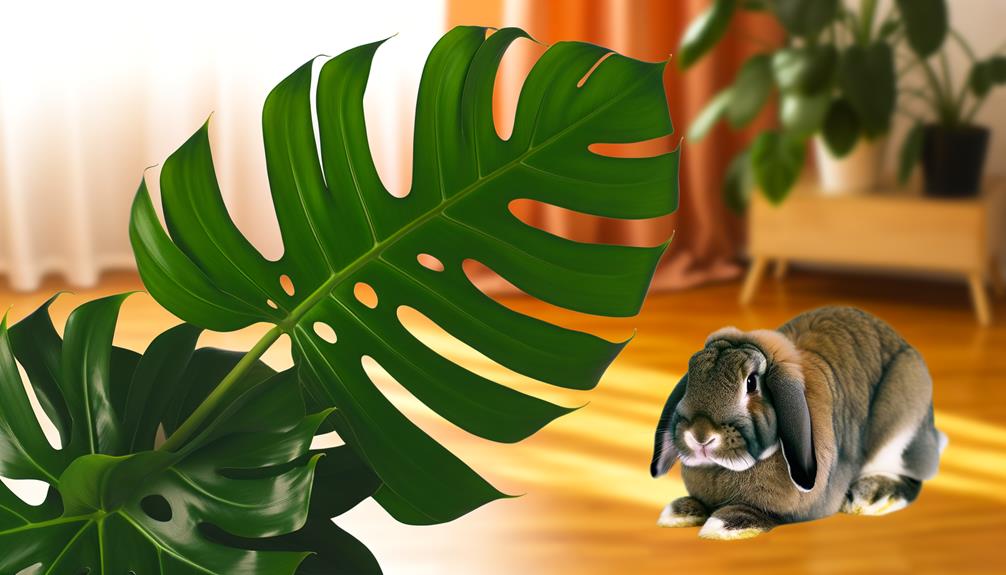
Monstera plants, scientifically identified as Monstera deliciosa, are popular decorative houseplants distinguished by their large, perforated leaves. These plants belong to the Araceae family and are native to tropical rainforests. Their unique fenestrations, or natural holes, facilitate improved light penetration and water shedding, imitating their natural habitat.
You’ll find that Monstera plants contain calcium oxalate crystals, which form insoluble compounds that can cause irritation. Handling these plants requires care, as the crystals can lead to skin irritation or sores. Additionally, if ingested, they can cause oral irritation, swelling, and gastrointestinal distress.
Understanding these aspects is essential for ensuring the safety of pets and humans around Monstera plants, highlighting the significance of informed plant care and handling.
Rabbit Dietary Needs
A balanced diet for rabbits is crucial for maintaining their overall health and well-being. Primarily, rabbits require a consistent supply of high-fiber hay, such as timothy or orchard grass, to support their digestive systems.
Fresh, leafy greens like romaine lettuce, cilantro, and parsley should be included daily to provide essential vitamins and minerals. Pellets formulated specifically for rabbits can supplement their diet but shouldn’t be the primary food source.
Guarantee clean, fresh water is always available. Avoid nutrient-deficient foods and high-sugar treats, which can cause gastrointestinal issues and obesity. Regularly monitoring their weight and fecal output helps guarantee they’re receiving proper nutrition.
Understanding these dietary needs is critical for preventing health complications and promoting longevity in rabbits.
Toxic Compounds in Monstera
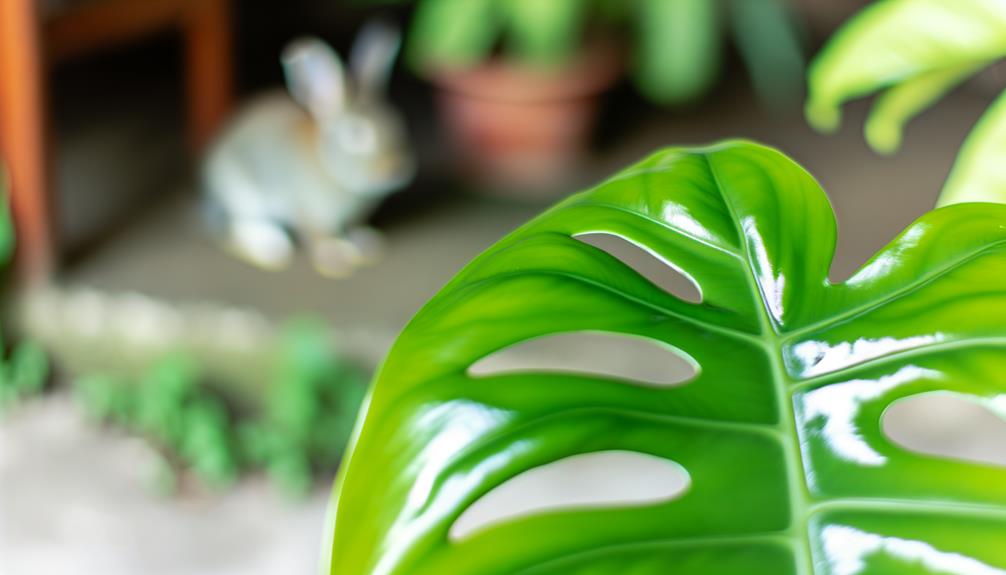
Monstera plants contain calcium oxalate crystals, which can cause serious harm if ingested by rabbits. When ingested, these compounds can lead to symptoms such as oral irritation, excessive drooling, and difficulty swallowing.
You should implement precautionary measures, like keeping Monstera plants out of reach, to protect your rabbits from potential toxicity.
Calcium Oxalate Crystals
Although beautiful, Monstera plants contain calcium oxalate crystals, which are highly toxic to rabbits. These needle-like crystals can cause significant harm when ingested. Understanding this compound is essential for the safety of your rabbit.
- Chemical Composition: Calcium oxalate crystals are composed of calcium cations and oxalate anions, forming insoluble crystals.
- Mechanism of Toxicity: Upon ingestion, these crystals can embed into the mucous membranes of the mouth, throat, and gastrointestinal tract, leading to irritation and swelling.
- Prevalence in Monstera: The concentration of calcium oxalate crystals is significantly high in Monstera plants, making them particularly hazardous compared to other houseplants.
Ensuring that your rabbit doesn’t have access to Monstera plants can prevent serious health issues.
Symptoms of Ingestion
Recognizing the symptoms of calcium oxalate ingestion in rabbits is vital for prompt and effective intervention. These compounds, found in Monstera plants, can cause immediate and severe reactions.
Symptoms include oral irritation, excessive drooling, and swelling of the mouth, tongue, and throat. If ingested, these crystals can lead to gastrointestinal distress, such as vomiting and diarrhea. Severe cases might even result in difficulty breathing and lethargy, requiring urgent veterinary care.
| Symptom | Description | Immediate Action |
|---|---|---|
| Oral Irritation | Redness and swelling in the mouth | Rinse mouth, seek vet advice |
| Excessive Drooling | Increased saliva production | Keep rabbit calm, contact vet |
| Gastrointestinal Distress | Vomiting and diarrhea | Hydrate, seek veterinary help |
Understanding these signs guarantees you can act swiftly to mitigate harm.
Precautionary Measures
Implementing cautionary measures is crucial to prevent accidental ingestion of harmful compounds in Monstera plants by rabbits. Monstera plants contain calcium oxalate crystals, which can cause severe oral irritation, swelling, and gastrointestinal distress in rabbits.
To safeguard your rabbits, follow these evidence-based recommendations:
- Relocate Monstera Plants: Position Monstera plants in areas inaccessible to rabbits, such as elevated shelves or separate rooms.
- Use Barriers: Install physical barriers like plant cages or gates to prevent rabbits from reaching the plants.
- Regular Monitoring: Frequently inspect the living environment to ensure no plant debris is within reach of your rabbits.
These measures, based on clinical knowledge and expert advice, will greatly reduce the risk of toxic exposure and promote the well-being of your pets.
Symptoms of Poisoning
Symptoms of Monstera plant poisoning in rabbits can include excessive drooling, oral irritation, and gastrointestinal distress. You might notice your rabbit pawing at its mouth or refusing food due to discomfort. Oral irritation often manifests as redness or swelling in the mouth and throat.
Gastrointestinal distress can present as diarrhea, vomiting, or abdominal pain. Other symptoms to watch for are lethargy, depression, and changes in drinking habits. Sometimes, you may observe difficulty swallowing or a cough, indicative of esophageal irritation.
It’s pivotal to monitor these signs closely, as they can escalate quickly. Recognizing these symptoms early on can make a significant difference in your rabbit’s health and recovery.
Immediate Actions If Ingested
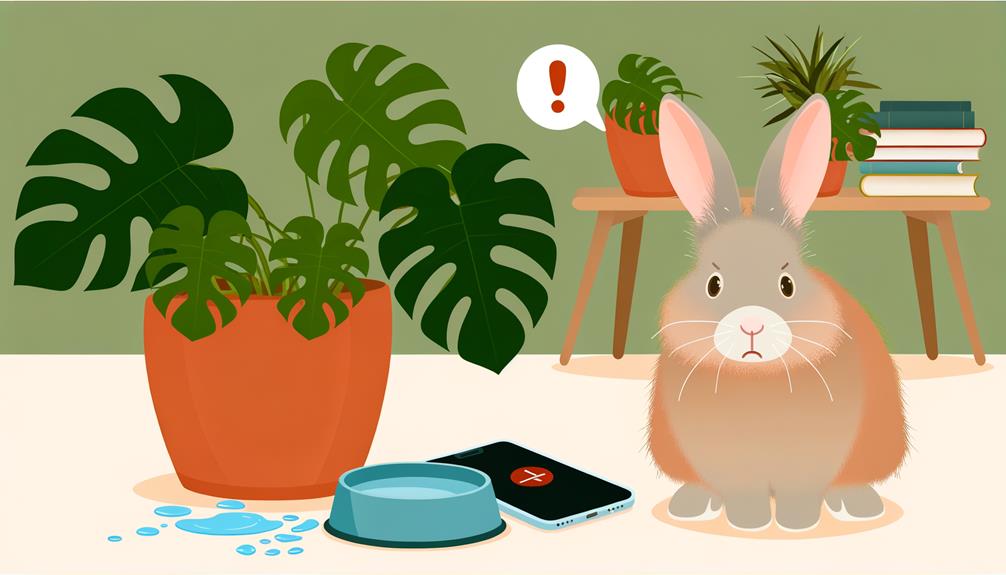
Should your rabbit ingest a Monstera plant, immediately remove any plant material from their mouth and contact your veterinarian for urgent guidance. Quick action can greatly impact the prognosis.
Follow these steps:
- Assess Symptoms: Look for signs of distress, drooling, oral irritation, or gastrointestinal upset. Clinical presentation will help your vet in determining the severity.
- Keep the Rabbit Calm: Minimize stress by placing the rabbit in a quiet, comfortable environment. Stress can worsen symptoms.
- Provide Information: Be ready to supply details about the ingestion, including the amount consumed and the time of ingestion. This data is essential for effective treatment planning.
Acting promptly and accurately can mitigate the toxic effects and improve recovery outcomes.
Safe Plants for Rabbits
Many plants, such as dandelion greens and basil, aren’t only safe for rabbits but also contribute to their nutritional needs. Dandelion greens are rich in vitamins A, C, and K, while basil provides essential antioxidants and anti-inflammatory properties. Incorporating these plants into your rabbit’s diet can enhance their overall well-being.
Other safe options include parsley, cilantro, and mint, which offer additional vitamins and minerals.
It’s essential to make sure that any plant you introduce is free from pesticides and thoroughly washed. Regularly rotating these greens can prevent dietary monotony and promote gastrointestinal health.
Always observe your rabbit for any adverse reactions when introducing new plants. Evidence-based practices show that a varied, plant-rich diet supports optimal health for rabbits.
Rabbit-Proofing Your Home
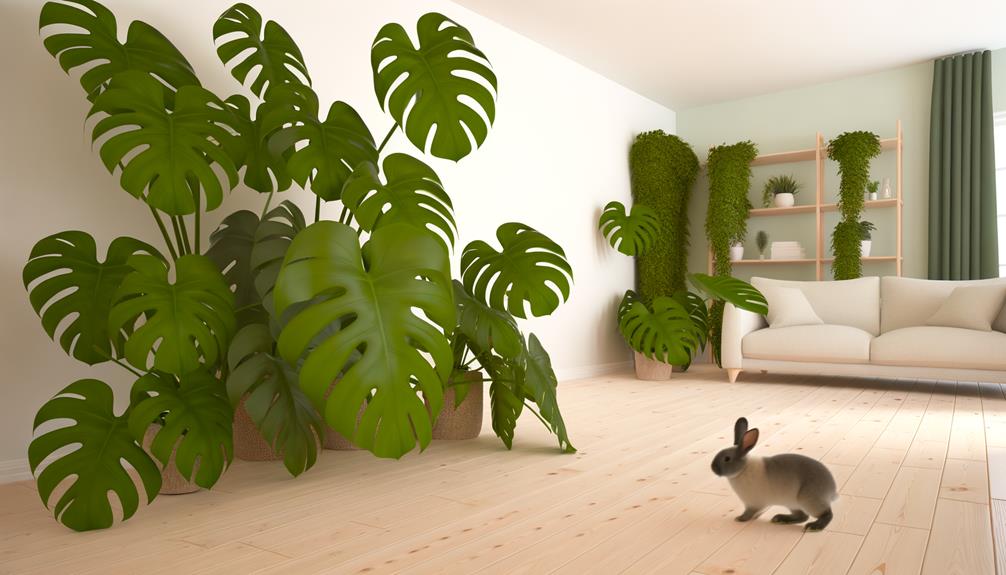
Ensuring the safety of your rabbit extends beyond their diet to include rabbit-proofing your home to prevent access to hazardous plants and objects. Rabbits are naturally curious and prone to chewing, which can lead to accidental ingestion of toxic materials.
Implement the following expert strategies to create a safe environment:
- Barrier Solutions: Use pet gates or playpens to restrict access to areas with toxic plants like Monstera.
- Secure Wiring: Encase electrical cords in protective tubing to prevent chewing and potential electrocution.
- Elevate Hazardous Items: Place plants and small objects on high shelves out of reach.
These measures are evidence-based and essential for minimizing risks, ensuring your rabbit’s health and safety within your home.
Consulting a Veterinarian
It’s important to consult a veterinarian immediately if you suspect your rabbit has ingested any toxic plants, like Monstera. Monstera plants contain insoluble calcium oxalates, which can cause oral irritation, excessive drooling, and gastrointestinal upset in rabbits.
Early intervention is vital to mitigate potential complications such as dehydration or severe digestive issues. Provide your vet with detailed information about the ingestion, including the plant type and amount consumed.
Quick, evidence-based care can greatly improve your rabbit’s prognosis. Your veterinarian may perform a physical examination, recommend diagnostic tests, or administer treatments like fluid therapy and gastrointestinal protectants.
Don’t attempt home remedies; professional medical advice ensures the best outcome for your rabbit’s health.
Creating a Safe Environment
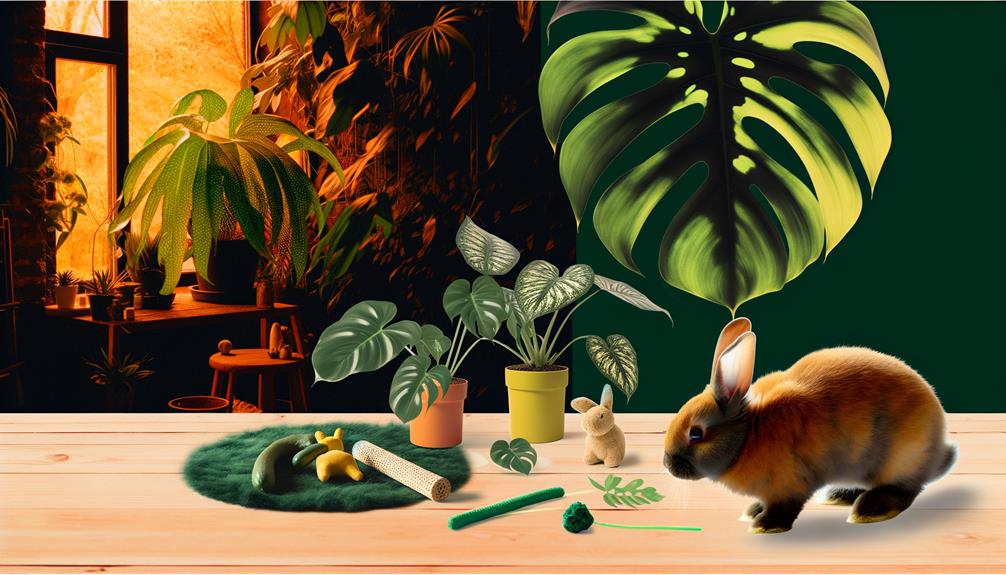
How can you create a safe environment to protect your rabbit from toxic plants like Monstera?
First, guarantee your rabbit’s living area is free from any Monstera plants. Monstera contains calcium oxalate crystals, which can cause severe oral irritation and gastrointestinal distress.
- Plant Identification: Regularly inspect your home and remove or relocate any toxic plants.
- Secure Housing: Use barriers or enclosures to restrict your rabbit’s access to areas with potentially harmful vegetation.
- Educate Household Members: Make sure all family members are aware of the dangers and know which plants are toxic to rabbits.
Conclusion
Coincidentally, while you’re sprucing up your home with lush greenery, it’s important to remember that Monstera plants contain calcium oxalates, toxic to rabbits. If your rabbit nibbles on one, immediate symptoms like drooling and difficulty swallowing could occur.
Prompt veterinary consultation can lessen severe health risks. Opt for rabbit-safe plants like basil and parsley. Your watchfulness guarantees a safe, enriching environment for your furry friend, blending your love for plants with their well-being seamlessly.

